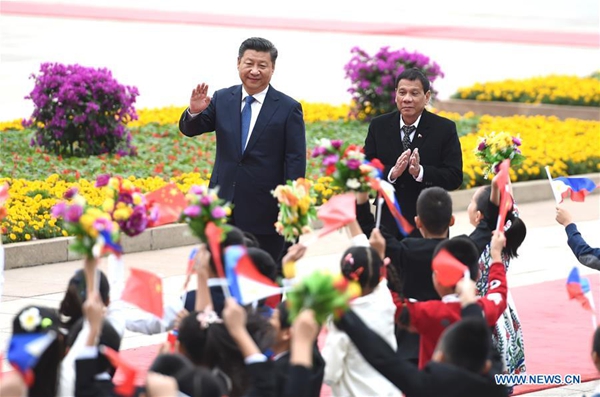Bandwagoning and Manila's pivot to Beijing
- By Sumantra Maitra
 0 Comment(s)
0 Comment(s) Print
Print E-mail China.org.cn, October 21, 2016
E-mail China.org.cn, October 21, 2016
|
|
|
Chinese President Xi Jinping (L) holds a welcome ceremony for visiting Philippine President Rodrigo Duterte (R) before their talks in Beijing, capital of China, Oct. 20, 2016. (Xinhua/Xie Huanchi) |
China and Philippines are signing over 13 billion U.S. dollar worth of trade deals, as reported by Reuters. Philippine Department of Trade and Industry Secretary Ramon Lopez was quoted to say that the visit by Filipino President Rodrigo Duterte was a milestone and will help in improving ties after the territorial dispute surrounding the South China Sea. President Duterte also said that he was announcing his "separation" from erstwhile ally United States. Duterte made the comments at a business forum in the presence of Chinese Vice Premier Zhang Gaoli at Beijing's Great Hall of the People during his visit, as reported by Reuters.
Hailing a new era, Duterte told Chinese President Xi, as quoted by the FT, "Even as we arrive in Beijing close to winter, this is the springtime of our relationship." While addressing Filipinos in China, Duterte said "I will not go to America anymore. We will just be insulted there; so time to say goodbye my friend."
This is a fascinating development, and quite possibly the most stunningly fast geopolitical reversal ever observed in International Relations.
The Chinese side made sure that their Filipino guests understand that the relationship between the two countries is brotherly, and would immediately return to a track of dialogue and consultation with regards to a proper settlement of the South China Sea issue, as the Chinese Vice Foreign Minister Liu Zhenmin said.
Duterte announced before his trip that he would ask Beijing to allow Filipino fishermen to again operate in the area, highlighting that the Scarborough Shoal (known as Huangyan Island in China) incident still plays a deterministic part in Filipino policy. However, this meeting has far greater ramifications than just the South China Sea issue. As, Vice Foreign Minister Liu said, "The two sides briefly mentioned the South China Sea. Both sides agreed that this issue is not the sum total of bilateral relations." He also said that China will lift restrictions on imports of tropical fruit from the Philippines and a travel alert for Chinese tourists to Philippines will be cancelled.
Duterte also said that the South China Sea issue will now take a backseat. In fact, no one expected this even a few months back, when the Philippines arbitration case verdict came out. Duterte now seems eager for a total pivot to Beijing. And surprisingly he is also interested in joint military exercises with Moscow, although it is hard at this stage to understand whether it is genuinely to fill a gap in Filipino military operational training, or just to alienate Washington further.
This forms the peak of a remarkable month for Philippines -- encompassing a total 180 degree turn from the arbitration verdict, to domestic drug wars, and to burning bridges with U.S. in a matter of days. As analysts try to understand what influenced this intense and fast pivot there might be explanations in International Relations which shed some light.
In International Relations literature, much has been highlighted and discussed when it comes to alliance formations. Stephen Walt, in his seminal work during the 1980s, highlighted conditions of state behavior including when states balance, bandwagon and buck-pass, etc. What we are seeing now, is perhaps an acute, tremendous and most classic textbook case of bandwagoning ever observed in any natural social environment.
So what is bandwagoning? Bandwagoning in International Relations is a phenomenon, which in theory suggests, occurs when a relatively weaker state changes course and aligns with a stronger, adversarial power. There are obviously several reasons which instigate such behavior, but without going into theoretical details, here's my hypothesis. When Duterte came to power in the Philippines he was partial regarding relations with both China and U.S., as I wrote at that time on these pages. What he was absolutely certain about though, was his almost religious zeal of clearing Filipino streets of crime and drug lords. He obviously didn't like being criticized on human rights grounds by an "ally." United States, and he made it quite clear several times. The U.S.' intelligence also deeply misjudged Duterte's volatility.
Added to that is classic structural causes. The rise of China as a giant next door complicated the threat assessment perceptions of smaller countries around it. As International Relations suggests, states either try to gravitate towards a rising giant, or go in a polar opposite direction, inviting other states to balance the rising power. Now, since Philippines' economy is related to China, and China is in much closer proximity than the U.S., Duterte has unsurprisingly chosen to be more accommodating to Chinese interests, and slowly start moving towards China. It is hard to predict over the longer term but almost certainly, in the short term, this is one of the fastest diplomatic turn-arounds I have seen in my life. There is still the possibility that the Filipino domestic situation will change, or that external pressures will influence the Philippines, but as of now, it is score-one for China.
Sumantra Maitra is a columnist with China.org.cn. For more information please visit:
http://www.china.org.cn/opinion/SumantraMaitra.htm
Opinion articles reflect the views of their authors only, not necessarily those of China.org.cn







Go to Forum >>0 Comment(s)